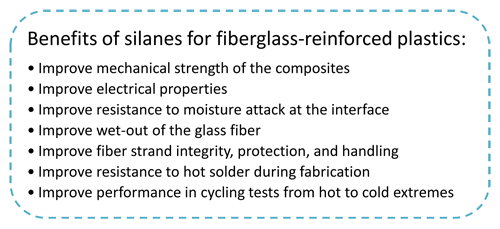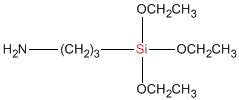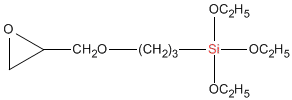Glass fiber is the most common reinforcing fiber for polymeric matrix composite. Silane coupling agents are a critical component of fiberglass-reinforced polymers. The fiberglass is very hydrophilic and attracts water to the interface. Without silane treatment on the surface, the bond between the glass fiber and the resin would weaken and eventually fail. Silane coupling agents are used on fiberglass for general-purpose reinforced plastic applications, such as automotive, marine, sporting goods and building construction, as well as for high performance applications in printed circuit boards and aerospace composites.
The chemical structure of the organic group in a silane coupling agent has a great effect on its performance in a composite, as measured by improvement of strength properties under wet and dry conditions. Fiberglass for general-purpose applications is treated with a dilute aqueous sizing bath consisting of a combination of ingredients (organic film formers, lubricants, antistats and a silane coupling agent). The silane must be soluble in the aqueous bath at levels of 0.2 to 1 percent. Normally, if a water bath is acidified with acetic acid to a pH of 4, even hydrophobic silanes will dissolve in the bath at low concentrations and give the stability needed to treat the fiberglass. Certain silanes, such as aminosilanes, are more hydrophilic and will dissolve at high concentrations in water even without pH adjustment.
The size is applied to the fiberglass at the glass fiber manufacturing plant immediately after the glass fibers are extruded and bundled into glass fiber rovings.

| SiSiB® CODE | CHEMICAL NAME | CAS NO. |
|---|---|---|
| SiSiB® PC1100 |  3-AMINOPROPYLTRIETHOXYSILANE 3-AMINOPROPYLTRIETHOXYSILANE |
919-30-2 |
| SiSiB® PC3100 |  3-GLYCIDOXYPROPYLTRIMETHOXYSILANE 3-GLYCIDOXYPROPYLTRIMETHOXYSILANE |
2530-83-8 |
| SiSiB® PC4100 |  3-METHACRYLOXYPROPYLTRIMETHOXYSILANE 3-METHACRYLOXYPROPYLTRIMETHOXYSILANE |
2530-85-0 |
